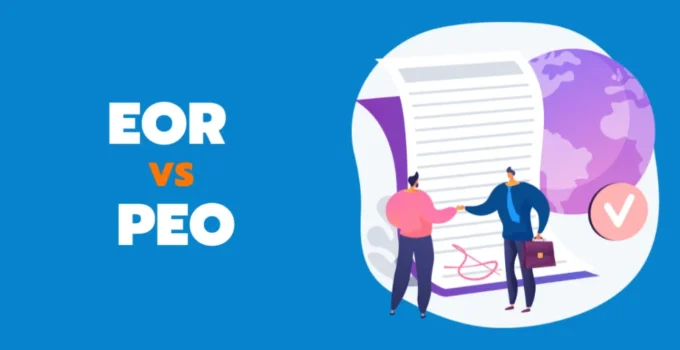In the world of business, it’s common to hear terms like EOR and PEO threw around, but what do they actually mean? And more importantly, which one is right for your business? In this article, we’ll explore the differences between these two and why you might want to choose an employer of record like Via.
First, let’s define our terms. EOR stands for the employer of record, while PEO stands for professional employer organization. At their core, both EORs and PEOs provide a similar service: they act as the employer of record for a group of employees. This means that they take on the legal and administrative responsibilities of employing workers, such as payroll processing, benefits administration, and tax compliance.

Source: genesishrsolutions.com
However, there are some key differences between the two. PEOs typically offer additional services such as HR support, compliance assistance, and employee training. They also tend to work with a larger number of companies, which allows them to spread out their costs and offer lower fees. On the other hand, EORs like Via are more specialized and often work with a smaller number of clients. This allows them to provide more personalized service and a higher level of expertise.
So, which one is right for your business? It depends on your specific needs and priorities. If you’re looking for a one-stop shop for all your HR needs, a PEO might be the way to go. However, if you’re looking for a more focused and customizable solution, an EOR like Via might be a better fit.
– One of the advantages of choosing an EOR like Via is that they offer a more hands-on approach to employment. Via doesn’t just handle the paperwork and legal compliance; they also take an active role in managing your employees. This means that they can provide guidance on issues like hiring and onboarding, performance management, and employee retention. By working closely with your EOR, you can ensure that your business is set up for success.

Source: integrityhr.com
– If you choose an employer of record like Via, you can benefit from the added flexibility of selecting the employees that best fit your business needs. Unlike working with a traditional hiring agency, which may limit your options, working with an EOR allows you to have more control over the hiring process. You can choose which employees you want to bring onto your team and which ones you want to let go, all while leaving the legal and administrative burdens of employment to your EOR. This means you can build a team that is specifically tailored to your business, without having to worry about employment compliance or payroll processing.
– Additionally, working with an EOR like Via can also help you navigate the complex landscape of international employment. If you’re looking to expand your business into new countries, an EOR can help you comply with local employment laws and regulations. Via, for example, offers a global employer of record services in over 170 countries, which means you can focus on growing your business without worrying about legal compliance.
Choosing the Right Approach for Your Business
In order to choose the right approach between EOR and PEO for your business, careful consideration of various factors, including payroll, is essential. First, evaluate your business needs and goals, taking into account factors such as long-term field development or immediate performance improvement. Next, assess reservoir characteristics, economic viability, regulatory constraints, and the impact on your payroll. Seeking advice from industry experts or service providers can provide valuable insights into managing payroll and other financial aspects. Additionally, studying successful case studies or real-world examples can offer guidance on optimizing payroll expenses. Making an informed decision, considering the long-term implications and potential risks will help ensure that you select the approach that aligns with your business objectives while effectively managing your payroll.





